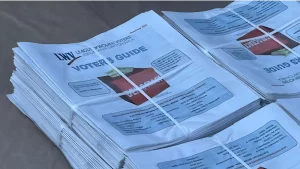By Deb Wenig
Deb Wenig was Dayton League President from 2001-2002
Every now and again people will say, “I want to be politically active, but not in a partisan way.”
That’s when the wise League member should jump in and say, “join League.” League historically has been a nonpartisan organization — and this is an enduring principle of the League. Writing in One Woman, One Vote, Nancy Cott noted the following just after suffrage was achieved: “Quickly evolving into a ‘good government’ rather than a feminist organization, its premise being to ready women for political life, the LWV found itself, ironically, competing with women’s partisan activity as much as preparing women for it. When all women became fair game for party organizations, Republican and Democratic women’s divisions vied with the nonpartisan League for the time and loyalty of women interested in politics.”
Today, each level of the League, be it local, state, or national, annually readopts their own version of the nonpartisan policy. Some policies are wordier and may be more restrictive than others, but basically the organization reaffirms through its nonpartisan policy our commitment to neither support nor oppose candidates for political office. This does not mean that as a League member you are prohibited from working for a candidate’s campaign or being a candidate yourself.
It does mean that the LWV will not endorse particular candidates. As an organization, we are careful not to appear in any way biased towards one candidate or another. Although some organizations may produce and disseminate information about officeholders’ voting records, and then indicate the organization’s policy positions, the League does not, lest it be construed as endorsing particular candidates. The LWVGDA policy does require greater caution by Board members and prohibits publicly partisan activities.
Yet, nonpartisan does not mean nonpolitical! We are intensely partisan on issues. By this we mean that we take positions and lobby in support or opposition to legislation at all levels and branches of government, after we have studied the issue.




